Kolding
Kolding (Danish pronunciation: [ˈkʰʌle̝ŋ]) is a Danish seaport located at the head of Kolding Fjord in the Region of Southern Denmark. It is the seat of Kolding Municipality. It is a transportation, commercial, and manufacturing centre, and has numerous industrial companies, principally geared towards shipbuilding. The manufacturing of machinery and textiles and livestock export are other economically significant activities.
Kolding | |
|---|---|
Town | |
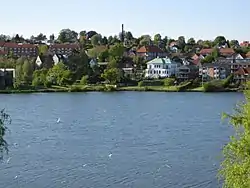 The castle lake "Kolding Slotsø" | |
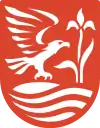 Coat of arms | |
 Kolding Kolding (left center) in Denmark | |
| Coordinates: 55°29′30″N 9°30′0″E | |
| Country | Denmark |
| Region | Southern Denmark (Syddanmark) |
| Municipality | Kolding |
| First documented | 1231[1] |
| Government | |
| • Mayor | Jørn Pedersen |
| Area | |
| • Urban | 37.9 km2 (14.6 sq mi) |
| Elevation | 50 m (160 ft) |
| Population (2020)[2] | |
| • Urban | 61,121 |
| • Urban density | 1,600/km2 (4,200/sq mi) |
| • Gender [3] | 30,213 males and 30,908 females |
| Demonym(s) | Koldingenser |
| Time zone | UTC+1 (CET) |
| • Summer (DST) | UTC+2 (CEST) |
| Postal code | 6000 |
| Area code(s) | (+45) 7 |
| Website | www |
With a population of 90,066 (1 January 2014), the Kolding municipality is the seventh largest in Denmark. The city itself has a population of 61,121 (1 January 2020)[2] and is also the seventh largest city in Denmark.
The city is part of the Triangle Region, which includes the neighbouring cities of Fredericia and Vejle.
History

In the Battle of Kolding, fought on 25 December 1658, the allied Polish and Danish forces under hetman Stefan Czarniecki defeated the Swedish forces of Charles X Gustav of Sweden.
A battle between German and Danish forces took place near the town on 23 April 1849 during the First War of Schleswig.
On 3 November 2004, the N. P. Johnsen's Fireworks Factory in the suburb of Seest exploded. One firefighter died, 85 people were injured, and around 2000 people were evacuated and some of them lost their homes during this disaster in this suburb of Kolding.
Overview
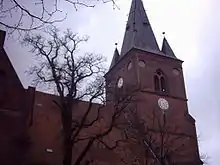
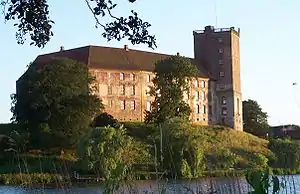
Located in Kolding is the former royal castle of Koldinghus. This was built in the 13th century by King Eric Klipping and is now a museum with certain parts of the castle, including its chapel and hall, being used for governmental ceremonial events. It was the last royal residence in Jutland. Another notable site is the 13th century stone Church of Saint Nicholas (Danish: Sankt Nicolai), which is one of the oldest in Denmark. Popular tourist attractions include the Trapholt art museum and the gardens Geografisk Have. Trapholt holds collections of Danish arts from 1900 onwards and a smaller number of non-Danish exhibits. Kolding is also the site of Designskolen Kolding, a university design school.
Main sights
The municipal museum, the Museet på Koldinghus, is located in the castle and former royal palace. It has a collection of Danish art from the late Middle Ages to the 1940s, miscellaneous artefacts of local interest, and an extensive collection of items in gold and silver.
The Trapholt art museum features many pieces from mainly Danish artists, along with a large collection of chairs.
Also Kolding houses the Danish Museum of Nurses (Danish: Dansk Sygeplejemuseum) which is situated in the former reception building of the former tuberculosis sanatorium for children. The exhibition also include this past of the buildings. The main part of the sanatorium is now a hotel, situated in a minor forest and overlooking the water. The building itself is very beautiful and built to resemble a palace.
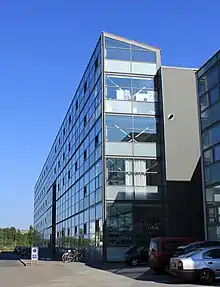
Education
A branch of University College South (Danish: University College Syd) can be found in Kolding.
A branch campus of University of Southern Denmark (Danish: Syddansk Universitet) is located in the former hospital which was closed in 1975. Further, the new Campus Kolding opened downtown in 2014.[4] The city is also home to Design School Kolding (Designskolen Kolding), established in 1967 and teaching undergraduate and postgraduate degrees in the areas of fashion, graphic design and textiles.[5]
The new building of University of Southern Denmark will be built further to the east at Grønborggrunden in central Kolding.[6]
Sister cities
Kolding is twinned with the following towns.[7]
| City | Region | Country | Year |
|---|---|---|---|
| 1997 | |||
| 1979 | |||
| 1946 | |||
| 1982 | |||
| 1947 | |||
| Nanortalik | 2007 | ||
| 1946 | |||
| 2000 | |||
| 2007 | |||
| 1979 | |||
| 1991 |
Notable people
Public Service & Public thinking
.jpg.webp)
- Princess Dorothea of Denmark (1546 in Kolding –1617) the Duchess of Brunswick-Lüneburg 1561-1592
- Mathias Sommerhielm (1764 in Kolding – 1827) a Norwegian Prime Minister
- Evald Tang Kristensen (1843 in Nørre Bjert near Kolding – 1929) a folklore collector and author
- Christian Peder Kryssing (1891 in Kolding – 1976) a collaborator with Nazi Germany in WWII
- Svend Petersen (1911 in Kolding – 1992) political researcher in the US, analyst and author
- Bente Hansen (born 1940 in Kolding) a Danish women's rights activist, writer and editor
- Uffe Haagerup (1949 in Kolding - 2015), mathematician
- Jørn Dohrmann (born 1969 in Kolding) a Danish politician and MEP
- Bjarne Corydon (born 1973 in Kolding), former politician, management consultant and business newspaper editor
- Karina Adsbøl (born 1976 in Kolding), politician, MP since 2011
The Arts
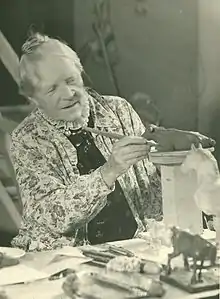
- Catharine Wernicke (1789 in Kolding – 1862) a Danish pianist, the first Danish woman to perform publicly as a pianist
- Anne Marie Carl-Nielsen (1863 in South Stenderup, near Kolding – 1945) a Danish sculptor
- Thorkild Roose (1874 in Kolding – 1961) a Danish actor and theatre director [8]
- Christian Daugaard (1901 in Kolding – 1993) was a Danish painter
- Lars Bo (1924 in Kolding - 1999), artist and author
- Erik Paaske (1933 in Kolding - 1992), actor and singer [9]
- Bent Faurby (born 1937 in Kolding) an author of children's literature and schoolteacher
- Ole Søltoft (1941 in Kolding – 1999) a Danish actor [10]
- Karl Aage Rasmussen (born 1947 in Kolding) a composer and writer.
- Merete Van Kamp (born 1961 in Kolding) a model turned actress and singer [11]
- Charlotte Eskildsen (born 1975 in Kolding) a Danish fashion designer.
- Susanne Georgi (born 1976 in Sjølund) a Danish singer, lives and works in Andorra
Sport

- Søren Petersen (1894 in Kolding - 1945), heavyweight boxer, silver medallist in both the 1920 and 1924 Summer Olympics
- Harald Christensen (1907 in Kolding – 1994) a cyclist, bronze medallist at the 1932 Summer Olympics
- Jan Mølby (born 1963 in Kolding), football player and coach; 364 club caps and 33 for Denmark
- Johnny Mølby (born 1969 in Kolding) a football manager and former player, over 350 club caps
- Tina Bøttzau (born 1971 in Kolding), handball player, twice team gold medallist at 1966 and 2000 Summer Olympics
- Martin Lundgaard Hansen (born 1972 in Kolding) a successful Danish badminton player
- Allan K. Jepsen (born 1977 in Kolding) former professional footballer, over 300 club caps
- Louise Spellerberg (born 1982 in Kolding), handball player
- Jonas Lössl (born 1989 in Kolding), soccer goalkeeper
See also
References
- Bøje, Jens Anker (19 June 2007). "Kolding - byens historie i korte træk" (in Danish). kolding.dk. Archived from the original on 7 June 2007. Retrieved 24 June 2007.
- BY3: Population 1st January by urban areas, area and population density The Mobile Statbank from Statistics Denmark
- BY1: Population 1. January by urban areas, age and sex The Mobile Statbank from Statistics Denmark
- https://www.sdu.dk/en/om_sdu/byerne/kolding/studieliv
- "Design School Kolding". Cumulus. Archived from the original on 20 March 2014. Retrieved 19 March 2014.
- Venskabsbyer Archived 10 June 2007 at the Wayback Machine
- IMDb Database retrieved 5 May 2020
- IMDb Database retrieved 5 May 2020
- IMDb Database retrieved 5 May 2020
- IMDb Database retrieved 5 May 2020
External links
| Wikimedia Commons has media related to Kolding. |
 Kolding travel guide from Wikivoyage
Kolding travel guide from Wikivoyage- Official website (in English)